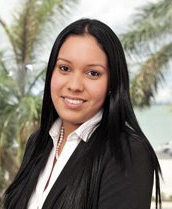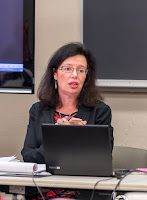Summer of Selflessness – Immigration Law Students Aid Immigrant Families at Karnes Detention Center in Texas
This past summer, a scouting mission led by Professor Lauren Gilbert and three St. Thomas Law students – Cristina Hernandez, Rebecca Tabares, Hiriana Tuch – volunteered at the Karnes Family Detention Center in Texas. The goal of the mission was to assist detained Central American women and children with their asylum claims.
 |
| Cristina Hernandez (3L) |
The group partnered with the Refugee and Immigrant Center for Education and Legal Services (RAICES) a non-profit agency, whose name translates to “roots” in Spanish.
The Karnes Detention Center holds about 500 women and children – mostly asylum seekers fleeing gangs, gender violence and/or state sponsored violence in El Salvador, Guatemala and Honduras. These women and children, who are seeking refuge in the United States, are detained at the border and placed into expedited removal proceedings. They are subject to immediate deportation if they cannot pass a credible fear interview.
Third-year student Rebecca Tabares stated that working at Karnes Detention Center was an eye opening experience because she was able to connect with women who had just entered the United States in search of the same thing her family once searched for – freedom and the opportunity for a better life.
 |
| Rebecca Tabares (3L) |
The asylum process evaluates persons who attempt to enter without proper travel documents but who indicate a fear of returning to their countries and get a credible fear interview (CFI) with an Asylum Officer (AO). They must convince the AO that they face serious harm, targeted at them, and that this harm would be inflicted because of one of five protected grounds: their race, religion, nationality, political opinion or their membership in a particular social group (PSG). If they pass their CFI, they get a full hearing before an Immigration Judge and are eligible for release from detention, usually with an ankle monitor. If they fail the interview, they get a brief hearing before an Immigration Judge, via video-conference. If the judge overturns the AO’s decision, they are eligible for release and a full hearing. If the judge affirms, they can be immediately deported, unless the Karnes team can convince Homeland Security that there was some defect in the process entitling them to another chance to be heard.
 |
| Professor Lauren Gilbert |
The St. Thomas Law team quickly became a part of the Karnes team and helped dozens of Central American women and children at various stages of the process, from initial intakes, to CFI preps, to IJ reviews. The work was non-stop. Third-year law students, Rebecca Tabares and Hiriana Tuch prepped a Honduran woman, with a two year old daughter, for her CFI. This involved hearing her story, developing a case theory, and preparing her for her interview. Hiriana attended the CFI. Rebecca assisted a woman who had received contraindicated medical treatment at Karnes, drafting a detailed declaration. Cristina Hernandez helped a young Salvadoran woman with a little boy who had failed her CFI. She met with her, drafted her declaration, developed a case theory, and accompanied her to her Immigration Judge Review.
 |
| Karnes Detention Center. Texas |
“Participating in the Karnes project allowed me to change the life of one Central American family forever, stated Cristina. “It was one of my most rewarding experiences both in as well as out of law school.”
Professor Gilbert has consistently provided hands-on, immersive experiences and opportunities for her Immigration Law students and, in the process, provides invaluable assistance to immigrant women and children; may of whom fear for their lives and the lives of their children.


